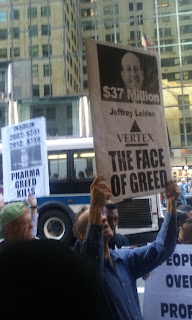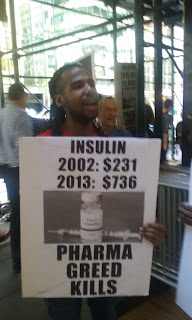 |
| Mark Milano, Bobby Tolbert and Annette Gaudino, of TAG, |
Yesterday,
I rode my bike up to 405 Lexington Ave to the offices of Mylan Pharma to join
friends from ACT UP, VOCAL, UAEM (Universities Allied for Essential Medicines) to
denounce Mylan and a pattern of price gauging that has become all too common.
 |
| Photos by Erik McGregor |
Arriving
at the Chrysler Building, my friend Michael Kerr was screaming, “Shame on
you Mylan Pharma! $600 for EpiPen that
costs $50.00. I hope you get dirty kitty litter for Christmas!” He paused. “or Chanukah.”
he continued. “Until congress acts, we
are going to have to resort to public shaming.” The presidential candidates
have to make this an issue.
The
crowd began chanting, “Heather Bresch,
whaddya say? How many kids have you killed today?”
Generations of ACT UP members were on hand. Those
who have been with ACT UP for almost three decades, as well as newer activists
with the Voices of Community Activists and Leaders. I asked Jim Eigo why he was here.
“This is just one more example of ACT UP taking on exorbitant
drug pricing that insurance cannot pay. The
company says they are passive victims of market forces, just part of an out of
control system. But we see it otherwise. These are clear choices the companies are
making. But today, we are seeing
rumblings about companies talking about just prices. We need a compact that companies not over
charge for medications. Its like certain pathogens that kill themselves because
they are too stupid.” Eigo suggested the same thing was happening with these
drug companies.
“Pills cost pennies, greed costs lives!” the crowd
began screaming.
Mark Milano explained, “We are here because the
dramatic increase in the cost of the EpiPen, from $50 to $600 dollars per
pill. Martin Shkreli is not an
outlier. Drug companies push up prices
and congress does nothing because pharma owns them. This does not just effect
People with AIDS. It effects everyone.
These prices could bankrupt Medicare!
Shame on every pharmaceutical company that is overcharging!”
“Drop the price now Heather! Drop the price
now!”
“Release
the drugs Heather!”
As we
were chanting, Mark Milano and several other activists tried to enter the
building.
But
we were locked out.
“You
have to pay $600.00,” one of the activists laughed.
“We
are here from ACT UP and VOCAL to protest price gauging,” Milano explained just
outside the Chrysler Building. “This is
but one example,” he continued, offering examples from Gilliad for their
hepatitis C drug, etc. “It is not just
Mylan. These companies see a chance to
rack up profits. “HIV medications can
cost up to $30,000 a year for one person.
But they cost $50.00 abroad.
These companies are profiting on our backs.”
Standing
in front of a piñata of an EpiPen, Milano took a swing, watching money fall
out.
This is
how they see EpiPen, as money, Milano continued.
“People
over profits, Drop the price now!” screamed the crowd.
Bobby
Tolbert, of VOCAL stood up to echo Milano’s sentiment, noting that his daughter
has asthma and can’t afford the EpiPen.
He argued that a just a society, needs fair affordable pricing for basic
good. “Bring the price down!”
Annette Gaudino, of TAG,
followed. “This is not just about greed.
This is about a system. There is no fair price for a monopoly. It’s a
hostage system, with companies and government working together.”
Milano pointed out that ACT UP was
watching. They would be attending congressional hearings on the topic.
We’ll be back.
As
ACT UP’s press release explained:
September
15, 2016 - New York, NY – On Wednesday afternoon, activists from ACT
UP/NY (AIDS Coalition To Unleash Power), VOCAL NY (Voices of Community
Activists and Leaders), UAEM (Universities Allied for Essential Medicines) and
other groups protested the ongoing U.S. drug pricing crisis, as
demonstrated by the 1,100% increase in the price for an EpiPen, a
device that can stop a life-threatening allergic reaction.
A giant EpiPen piñata filled with gold coins was
smashed to visualize the greed of the pharmaceutical industry, which threatens
millions of lives every year.
The
protest took place outside the New York City office of Mylan Pharmaceuticals in
the Chrysler Building. Mylan, the maker of the Epipen, raised its
price from $50 in 2004 to $600 today (the device costs about $20 to
make). At the same time, Mylan CEO Heather Bresch saw her salary jump
from $2.5 million to $19 million. Mylan has also increased prices over
20% on 24 other drugs, including a 542% increase on a gall stone medication.
Activists
were also protesting Gilead Sciences who put a $1,000 per-pill price tag on its
hepatitis C drug Sovaldi and Pfizer, Inc which raised prices this year for more
than 100 of its drugs, some by as much as 20%.
Activists
also decried the price hikes for Naloxone, used to reverse opioid overdoses,
which costs over 17 times what it did two years ago, and Insulin, the price of
which has jumped over 200% from 2002 to 2013.
Pharma
claims their high prices reflect research costs. But a study published in JAMA
found that drug companies invest only 10 to 20% of their revenue in research.
The authors wrote, “Prescription drugs are priced primarily on the basis of
what the market will bear.” Much
critical drug research actually takes place in publicly-funded academic
institutions or with other taxpayer funding.
ACT
UP member Mark Milano said, “Since American taxpayers fund much of the research
that goes into creating these medications, we can’t then hand it off to
pharmaceutical companies to charge exorbitant prices that we can’t afford or
that bankrupt us. High drug prices reduce accessibility and risk people’s
lives.”
 |
| Photos by Brandon Cuicchi |
END THE DRUG PRICING CRISIS!
1,100% INCREASE IN EPIPEN BETRAYS MUCH LARGER
PROBLEM
Every few weeks, we hear of another drug company charging
exorbitant prices for lifesaving medications. Pharma has clearly become an industry of cash hungry profiteers, instead
of a healthcare industry focusing on keeping individuals and the public alive
and healthy. We need to National price controls and FDA reform to end
Pharma Profiteering.
Here are just a few examples:
· Mylan jacked up the price for an EpiPen, a device that can stop a
life-threatening allergic reaction. Its price has risen from $50 in 2004 to
$600 today (the device costs about $20 to make). At the same time,
Mylan CEO Heather Bresch saw her salary jump from $2.5 million to $19
million. Mylan has also increased prices over 20% on 24 other drugs,
including a 542% increase on a gall stone medication.
· Gilead Sciences put a $1,000 per-pill price tag on its
hepatitis C drug Sovaldi. Now, it has flatly refused to offer AIDS Drug
Assistance Programs any price reduction on any of its hep C drugs.
· Valeant Pharmaceuticals increased the prices of two crucial heart
medications by up to 525%.
· Pfizer, Inc . raised prices this year for more than 100 of its
drugs, some by as much as 20%. Its pneumonia vaccine costs 68x more
than in 2001, leading to $28 billion in sales for Pfizer & GSK.
· Turing Pharmaceuticals raised the price of Daraprim 5,000%, from
$13.50 to $750 a pill.
· Insulin, used to treat diabetes since the 1920s, jumped
over 200% in price from 2002 to 2013.
· Asthma inhalers , which once cost under $15, now cost up to
$100.
· Naloxone , used to reverse opioid overdoses, costs over 17 times what
it did two years ago.
Pharma claims their high prices reflect research
costs. But a study published in JAMA found that drug companies invest only 10
to 20% of their revenue in research. The authors wrote, “Prescription drugs are
priced primarily on the basis of what the market will bear.” Much critical drug research actually takes place in
publicly-funded academic institutions or with other taxpayer funding.
Not one of the 15 drug-pricing bills recently
introduced in Congress made it out of committee. Why? Because Big Pharma spent
$240 million on lobbying last year, more than any other industry.
· The Bayh-Dole Act mandates that any drug developed with public financing
be available on “reasonable terms”. If it isn’t, the government should “march
in” and license the drug to other suppliers.
· The government should regard extreme prices as it does drug
shortages, allowing for emergency imports of cheaper products.
· The U.S Patent Office and the FDA should stop handing out market
exclusivity for patents on drugs and delivery devices that offer little or no
additional benefit.
· A national body should set price ceilings for essential medicines
(as occurs in other countries) and review price increases on drugs that have
not changed.
· The NIH must serve the public, rather than being held hostage by
Pharma monopoly prices. Drugs substantially funded by taxpayers should not cost
more in the U.S. than in other wealthy countries.





























































No comments:
Post a Comment